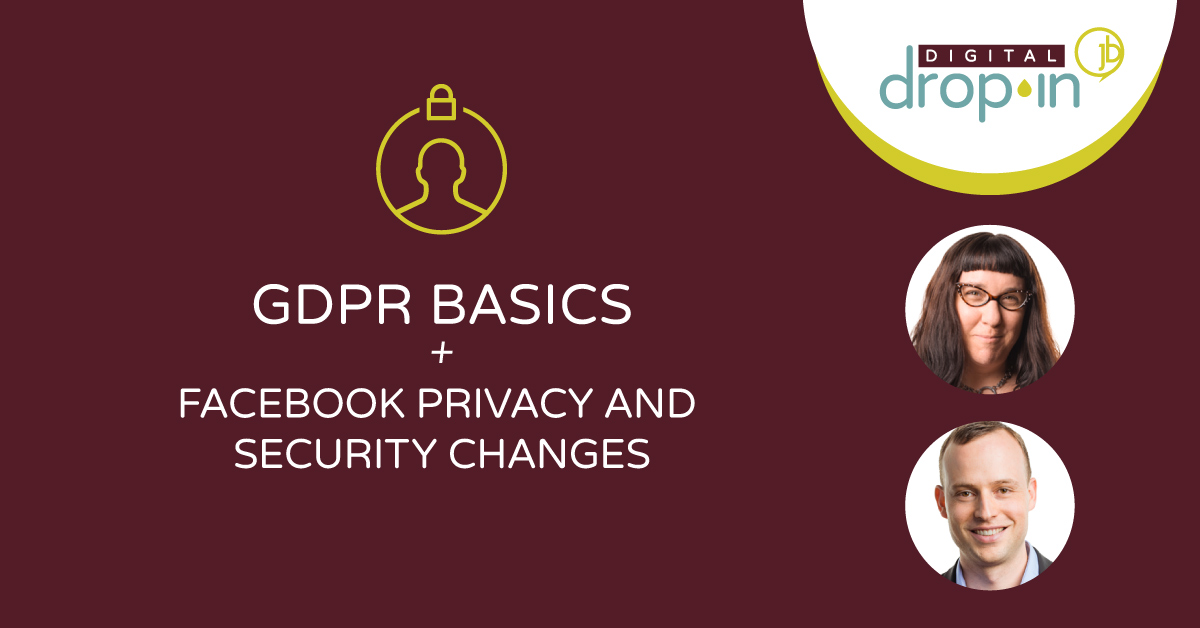Facebook has been undergoing some major changes lately, especially with privacy and security. In this recent Digital Drop-In webinar, Sarah Benoit discuss Facebook changes, the direct impact of these changes, and what you need to know to successfully move forward. In Part Two of this webinar, Justin discusses the GDPR.
Facebook: Fast Facts
- Facebook is no longer just a social media community; it’s an integral way that people across the world communicate.
- Active Facebook user spends 30 – 40 minutes on the site every day (2018).
- A Deloitte survey found that for many smartphone users, checking social media apps are the first thing they do in the morning—often before getting out of bed.
The Facebook Saga Continues: What You Need to Know
Over the last few years, Facebook has been in the limelight—but not for positive reasons. First, multiple studies, including one in the Harvard Business Review, revealed that social media may have negative emotional and mental impact. Humans thrive when they have strong, positive relationships with other human beings. But does this connection apply with online relationships? Some research has concluded yes; but other studies have found the opposite. People who suffer from anxiety and depression may be more negatively impacted from social media.
Research has also shown that the use of social media may:
- Detract from face-to-face relationships
- Reduce investment in meaningful activities
- Increase sedentary behavior by encouraging more screen time
- Lead to internet addiction
- Erode self-esteem through unfavorable social comparison
Election Ads Purchased by Russia
Next, Facebook was accused of having election ads purchased by Russia and Russian companies. Facebook had to testify before Congress because of this. In remarks to Congress, Facebook said the Internet Research Agency, a Russian company linked to the Kremlin, posted 80,000 pieces of divisive content shown to about 29 million people. Facebook also said it identified more than $100,000 in advertisements paid for by the Internet Research Agency. This content was also on Twitter and YouTube.
The Cambridge Analytica Scandal
Meanwhile, the Cambridge Analytica Scandal was also brewing.
- In 2010 Facebook launched Open Graph to third-party apps. This allowed external developers to access a large amount of users’ personal data.
- In 2014 Facebook adapted its rules to limit a developer’s access to user data.
- In 2015 Ted Cruz used Cambridge Analytica to help with his presidential campaign.
- In 2016 Trump’s campaign team used Cambridge Analytica for help with ads as well.
- By 2018, The Guardian and The New York Times reported that as many as 87 million Facebook profiles were harvested for Cambridge Analytica in a major data scandal. Christopher Wylie, a co-founder of the political data analytics firm, claimed the data sold to Cambridge Analytica was then used to develop “psychographic” profiles of people and deliver pro-Trump material to them online.
- The Federal Trade Commission (FTC) opened an investigation into whether Facebook had violated a settlement reached with the U.S. government agency in 2011 over user privacy protections. Meanwhile, U.S. lawmakers urged Zuckerberg to testify before Congress.
- In March of 2018, Mark Zuckerberg responded and apologized. Zuckerberg also announced that Facebook would no longer allow app developers to access users’ data after three months of inactivity and it would reduce the amount of information people are required to hand over to third parties.
- In April of 2018, Zuckerberg testified before Congress.
- In May of 2018, Zuckerberg testified before the European Parliament.
So What Happened And What Should You Do?
- Some advertisers left Facebook, including major companies.
- As a platform, Facebook lost over $60 billion the week the Cambridge Analytica story broke.
- Facebook’s stock dropped more than 13% in March of 2018.
- In July 2018, Facebook stock dropped roughly 20% and lost $120 billion in value. This was the largest loss in the history of the stock market.
As far as Facebook security goes, check your mobile phone security settings. Also adjust your privacy settings from your computer. When you’re on your Facebook page, click on the question mark in the upper right-hand corner. From there, choose, ‘Privacy Checkup’ and ‘Privacy Shortcuts’ to adjust your preferences.
Part 2: What is GDPR and Should You Care?
The General Data Protection Regulation (GDPR) is a legal framework that sets guidelines for the collection and processing of personal information of individuals who are citizens of the European Union (EU). The GDPR passed in 2016 and officially went into effect in May of 2018.
Even if you are not directly targeting citizens of EU countries, they may still be visiting your website. Fines for noncompliance are very high with $20 million Euros as the standard fine.
GDPR Requirements
- Data: Users can ask to see what data any business has collected and stored about them. They can also ask for the data to be deleted/removed.
- Email and Data Use Consent: Users must actively opt in to each type of email and data driven targeting. Pre-checked opt-in fields and opt-in text within terms of service or promotion rules are no longer allowed.
- Breach Notification: Any data breach that exposes users’ data must be reported within 72 hours.
For more information, learn what small business owners should know about GDPR and how GDPR affects US-based small businesses.
Facebook Third Party Data
In 2013 Facebook announced that they were going to allow advertisers to target hashed lists of existing and potential customers, and categories like role-playing gamers or soda drinkers. This third party data allowed targeting based on purchase behavior and also allowed Facebook to estimate people’s income, net worth, and other characteristics that could be used in Facebook saved audience targeting.
Because of Facebook’s above mentioned scandals, as well as their attempt to comply with new regulations, Facebook has decided to remove third party data. Does this mean less targeting options for advertisers? About half of Facebook’s 1,200 targeting criteria come from third-party data sources. But, there are still around 600 targeting criteria based on Facebook’s own data. You can also still use custom audiences and lookalike audiences.
Want to learn more about digital marketing? Join us for our monthly free Digital Drop-In webinars, attend a bootcamp in Asheville, or enroll in the full JB Media Institute curriculum.



